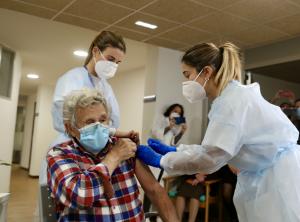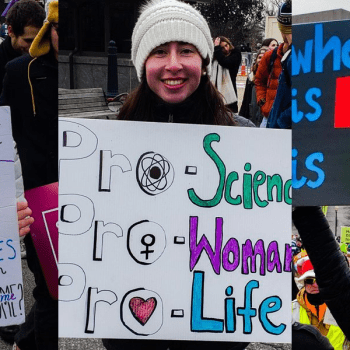Recently, the FDA approved the Johnson & Johnson COVID vaccine (emergency use authorization). This brings up the ethics of it for many Catholics. This is the third COVID vaccine approved by the FDA and it is different biologically and morally from the prior two.
Morally, we should generally prefer the other two options available so far, but this one is not morally forbidden. The Johnson & Johnson vaccine can be used if it is the only option or only way to seek some other good. Before going into why that is, I think it is good to cover a bit of biology and moral theology.
Biology of Different Vaccines

The goal of any vaccine is to produce a response in the adaptive immune system granting immunity to a certain disease. Historically, most vaccines used copies of the virus that were modified. They were either dead or chemically treated to seriously hinder their reproduction.
With COVID, some new types of vaccines have arisen. The first two approved in the USA (Moderna and Pfizer) use mRNA for the external spike protein of COVID to alert your immune system to what this protein is like. (I have gone more in-depth on this before, but it is not the focus here.)
The Johnson & Johnson vaccine uses a method called “Replication-defective Adenovirus vector.” I think one way to understand this is by examining the three terms. Replication-defective refers to when viruses for vaccines are mutated so they can’t reproduce on their own. Part of their genome is removed so they can’t reproduce in ordinary circumstances. They are grown on a special growth medium where these extra genes needed for reproduction are present, but that medium is removed before use. Terms like “replication-deficient” or “replication-incompetent” are synonyms. Adenoviruses are a category of viruses. The usual reproducing type can cause a cold but those that can’t reproduce won’t have enough copies to do more than have some soreness and swelling where injected. A vector vaccine is a vaccine where some vector (this virus) carries something to the cell (in this case RNA). Once the RNA gets to the cell, the process is like mRNA vaccines. (1, 2, 3, 4)
Fetal Cell Lines
The big moral question that comes up involves fetal cell lines. The special growth medium used to grow this vaccine is modified PER.C6 cells, a fetal cell line. The Moderna and Pfizer vaccines only used HEK293, a different fetal cell line, in testing.
Fetal cell lines are not cells from aborted babies. No baby was aborted to produce them. What happened was that an abortion happened, then some cells were taken from the baby, then they were modified, and their descendant cells were grown in a lab for decades. Human cell lines are used in many experiments. The most common human cell line used is HeLa taken from Henrietta Lacks in 1951 as part of a cancer biopsy. Lacks died not long after from that cancer, but HeLa is still used today. HeLa is related to Lacks but is not her as it is a single type of cells separated from her body. It is similar to how I lost a decent-sized piece of skin on my elbow as a kid when I fell and had a U-shaped cut. Once no longer connected to my body, that skin was no longer part of me.
Several cell human cell lines have been developed from fetuses that were aborted. These are often used in scientific experiments including vaccines. To give a sense of the scope of their use, I found the top-10 prescriptions and most common OTC drugs except Gas-X had been tested on just the HEK293 cell line. Doing a search for “HEK 293” on Google Scholar brings up 201,000 articles. So, these cell lines are not used just for COVID vaccines by any stretch.
Basics of Moral Theology
Morally, there are three elements of an act. First, the object or what we are doing. In this case, we are immunizing ourselves. Second, the intention. In this case, we are usually doing so for our own health and/or the health of others. These two elements can often be perfect. The third element, circumstance, on the other hand, is not usually perfect. For example, today I drove to say Mass for some people. Doing so, I polluted the environment. This makes the act of driving imperfect, but it was still the best option given the circumstances.
One way that almost every act we do has imperfect circumstances is by cooperation with evil or appropriation. Cooperation involves us somehow contributing in some way to an act that otherwise would not happen. Appropriation is taking something from a previous evil act but without contributing in any way to a future act that otherwise would not happen. Cooperation is more serious, but still often only makes an act imperfect, not immoral.
Cooperation is always forbidden if proximate – like being the getaway driver in a robbery or the nurse handing instruments to an abortionist. Cooperation is also always immoral if formal, that is where you want the evil result of the act.
The Moral Importance of Cooperation
When considering the moral weight of remote cooperation, we need to consider both the evil and the remoteness. The more-evil or the less-remote, the more we have a moral obligation to avoid it. For example, there is a big difference between being the receptionist for an abortion clinic and being the receptionist for one part of a hospital when another part in the same hospital does abortions. There is also the difference between being the receptionist for an abortion clinic and for a print shop that sometimes prints stuff with profane language.
When dealing with fetal cell lines, the evil of abortion is quite serious, but our reception of medicine (including vaccines) is quite remote. First, the abortion was not done for the purpose of getting fetal lines but abortions were chosen for other reasons and the scientists just took cells from abortions already happening. (These abortions were still gravely evil acts.) Second, the cells were modified and they are currently many generations removed from the cells taken from the aborted baby. Third, we are not using them ourselves like scientists are but using some products related to them.
Cooperation vs. Appropriation in the Different Vaccines
At this point, the Johnson & Johnson vaccine is slightly less remote than Moderna and Pfizer. Johnson & Johnson grows the vaccine on a fetal cell line while Moderna and Pfizer only tested their vaccine on a fetal cell line. The testing adds another layer of remoteness to the connection between us and abortion. If they don’t repeat testing for quality control, it’s simply appropriation as the cell lines have been used but are not currently being used, so 1 million more getting the vaccine or not does not change the use of fetal cell lines.
It is worth noting that in any case, the evil we participate in is likely future cases where they will take new cell lines from aborted babies to replace existing lines. Walvax-2 taken in 2015 to replace the MRC-5 line shows this can happen. If by 2010, we had stopped using MRC-5, I doubt Walvax-2 would have been created.
We can do an act that involves some remote cooperation in evil. Jesus said his followers should pay Roman taxes (Matthew 22:21) knowing that Roman taxes funded pagan temples and the unjust use of violence. St. Peter said we should “Honor the emperor,” (1 Peter 2:17) even though he knew the emperor was corrupt. Supporting the Roman Empire in these ways was less remote than any existing vaccines.
What Can Use Johnson & Johnson?
In general, immunization is a great positive good. Each of us without a medical exemption should choose to get vaccinated against COVID. Nonetheless, these vaccines with such remote cooperation are not morally obligatory: if you choose not to vaccinate, the Vatican notes that you then need to take other steps to avoid transmitting COVID to others. If our circumstances allow us, we should choose a vaccine that is less connected to abortion. However, the connection with abortion of the Johnson & Johnson vaccine is insufficient to forbid its use.
In fact, the Vatican noted in December, “When ethically irreproachable Covid-19 vaccines are not available… it is morally acceptable to receive Covid-19 vaccines that have used cell lines from aborted fetuses in their research and production process.” If you want a comparison, the Vatican, the National Catholic Bioethics Center, and many other experts in Catholic bioethics have approved using vaccines grown on fetal cell lines for rubella and chickenpox which both have lower death rates than the lowest estimates for COVID. Thus, a fortiori such principles would apply to a disease with a higher death rate. [EDIT: I made a short thread comparing the survival rates of other diseases the Church has long-permitted we use vaccines grown on fetal cell lines to COIVD. This gives the numbers to what I simply stated here.]
Final Notes
When our turn comes up for vaccination, we should ask which vaccine and prefer those with less connection to fetal cell lines. Even if there is no option, hundreds of thousands or millions asking will help let health authorities know they should avoid vaccines grown on fetal cell lines going forward. The Catholic Medical Association even has a form letter you can send to these companies to express your wish for more moral vaccines.
Some places will only get the Johnson & Johnson vaccine: then one is morally free to take it. Also, some circumstances might indicate that vaccinating quicker via a single dose gives sufficient reason to choose it over the other dual dose vaccines. This would not usually be the case, but if you need to visit a dying relative or travel for a family wedding, the 3 weeks’ quicker time frame might justify using Johnson & Johnson over the others, even if available.
As a final note, if the US approves the Oxford / AstraZeneca vaccine or you are in another country that has it approved, the biology and ethics are similar to Johnson & Johnson.
Note: please support me and my community on Patreon so I can keep writing articles this.
UPDATE: The USCCB issued a statement saying similar things to what I posted above just before I posted this. I wrote this earlier in the day when no statement had been issued and didn’t double-check if they had made a statement before I posted.















